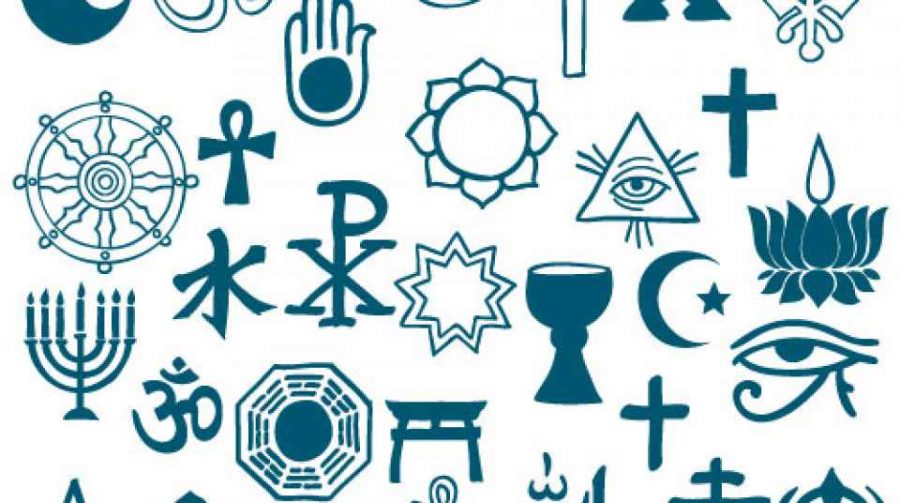Diversity on campus goes further than skin color, language
Students, faculty practice a wide variety of religions
As you walk the halls you will see different skin colors and hear different languages, AHS is a diverse school. But it goes beyond what you can see and hear. Many different religions are practiced by the students and faculty. There are Christians, Baptists, Jews, Muslims, Mormons and even Satanists walking the halls. As a public school, no one religion can be endorsed but no religion can be prohibited either.
To explore the multitude of faiths represented on campus I sat down and spoke with teachers and students of various faiths.
Heather Long, geometry teacher, has been a Christian since she was a child.
CW: What is the core belief in your religion?
HL: God is good and he rules above all. We want to be like Jesus.
CW: How does being Christian affect your day-to-day school life?
HL: [It] Helps me deal with stress.
CW: Have you ever considered changing religions?
HL: No, because I have a relationship with God and Christianity best fits having a personal relationship with God.
CW: Do you think public schools should offer a world religions class?
HL: Yes, because a person’s religion affects how they see the world. It’s important to have an idea of what other people’s religions may be.
CW: What are some misconceptions about your religion?
HL: I think the biggest misconception is that God is angry and wants to punish people for doing wrong instead of recognizing that God is loving and forgives.
Travis Belmontes-Merrell, ASL teacher, has been a Southern Baptist since he was five years old.
CW: What is the core belief in your religion?
TBM: Southern Baptists believe in God alone.
CW: How does being Baptist affect your day-to-day school life?
TBM: [It] Doesn’t affect much, the only thing is lifestyle.
CW: Have you ever experienced negativity at school because of your religion?
TBM: No, most people are very positive and open.
CW: Have you ever considered changing religions?
TBM: Yes, Catholic, because my husband is Catholic.
CW: Do you think public schools should offer a world religions class?
TBM: Yes, to allow students the chance to gain more knowledge about religions around the world.
CW: What are some misconceptions about your religion?
TBM: That Baptists are a very controlling group, but we’re not, we’re friendly and open minded.
Lizzy Davis, junior, was born into a Messianic Jewish household.
CW: What is the core belief in your religion?
LD: God and Jesus.
CW: How does being Jewish affect your day-to-day school life?
LD: Big time. Christmas isn’t celebrated because we have Hanukkah. I miss days of school for Jewish holidays. And there aren’t any Jews at school so people don’t understand.
CW: Do you think public schools should offer a world religions class?
LD: It would be interesting. It might change people’s spectrum on what others believe and open their minds.
CW: What are some misconceptions about your religion?
LD: That we don’t believe in Jesus. Jesus was Jewish.
Fatima Alaredhi, senior, has been a Muslim since birth.
CW: What is the core belief in your religion?
FA: Be a good person, have good morals.
CW: How does being Muslim affect your day-to-day school life?
FA: I have to wear certain clothes and prayer five times a day, and we celebrate Ramadan which includes fasting for a month.
CW: Have you ever experienced negativity at school because of your religion?
FA: As jokes, but nothing too rude.
CW: Have you ever considered changing religions?
FA: No, because it’s what my family is.
CW: Do you think public schools should offer a world religions class?
FA: No, it could be controversial and parents could think it would be an influence.
CW: What are some misconceptions about your religion?
FA: That we’re terrorists.
Carly Brecht, senior, has been a Mormon (The Church of Jesus Christ of Latter-day Saints) her whole life.
CW: What is the core belief in your religion?
CB: It’s another form of Christianity, we have different standards.
CW: How does being Mormon affect your day-to-day school life?
CB: Every morning before school I attend seminary which is basically a bible study at 5:45 a.m.
CW: Have you ever experienced negativity at school because of your religion?
CB: Yes, people compare it to the musical “The Book of Mormon”.
CW: Have you ever considered changing religions?
CB: No, I feel happier and it makes me a better person.
CW: Do you think public schools should offer a world religions class?
CB: Yes, because there is a lot of confusion with what we believe.
CW: What are some misconceptions about your religion?
CB: Just because we can’t drink coffee doesn’t mean we can’t have phones.
Dani Hodges, senior, started practicing Satanism two years ago.
CW: What is the core belief in your religion?
DH: We don’t believe in gods, and it is based on interpretations of the center of evil being Satan or Lucifer.
CW: How does being a Satanist affect your day-to-day school life?
DH: It doesn’t at all.
CW: Have you ever experienced negativity at school because of your religion?
DH: Yes, people stopped talking to me.
CW: Have you ever considered changing religions?
DH: No, I like the rules and it’s very laid back.
CW: Do you think public schools should offer a world religions class?
DH: No, there are many different religions and branches of religions; there are too many to cover.
CW: What are some misconceptions about your religion?
DH: That we sacrifice animals, that we’re violent people, that we do drugs.
The diversity of AHS stems from more than just the ethnic backgrounds of the students and staff. Their beliefs shape who they are and make the culture of AHS richer.

